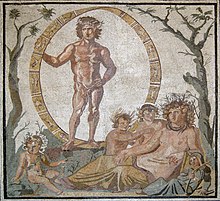Classical Mythology/Etiology
 An aition is a story told to explain something. Many ancient Greeks and Romans interpreted their myths as allegorical explanations for phenomena in the natural world. In its simplest form, there are folktales, legends, or stories about how the fox got its fluffy tail, how the Grand Canyon was created in the stories of Pecos Bill, or how the snake lost its legs. The Greek myth about the male god Ouranos (the Sky) sleeping with the female Gaia, the Earth, is often understood to be an explanation for natural phenomenon.Like a man, the sky squirts its liquid seed (rain) onto the earth, which later bears children (plants and crops), as a woman would. Some ancient Greeks even connected the name Ouranos with the word ouranein, to urinate. Many (but not all) mythologies have a male sky god and the earth personified as a female, perhaps because it offers a comforting analogy or explanation for the way nature works. Ancient and modern students of myth have reduced all myths to explanations for nature. For an extreme example, consider the interpretation by the Stoic Heraclitus of the illicit affair of Ares the God of War with Aphrodite, Goddess of Love and the wife of Hephaestus in Book 18 of Homer's Odyssey. This episode of the gods engaging shamelessly in illicit sex and voyeurism is revealed to be an innocent allegorical explanation for iron-forging. The house of Hephaestus stands for the forge; Hephaestus himself equals fire, and putting Ares in chains is about using technology to make iron pliable. Aphrodite is the heat brought to bear on iron. Poseidon enters the picture later, standing in for the final stage of dipping the iron into water. Fire conquers iron, Hephaestus conquers Ares. An etiological definition of a myth would be:
Essentially, the etiology theory argues that myths are created to explain the natural world and that myths that offer the most successful and most comforting explanations are passed down and become part of the culture. The etiology theory can be combined with claims that myths offer some sort of early or "primitive" science. Earlier humans did not have a scientific account for why floods, famines, plagues, illness, or death happened. When someone claims that myths primarily arise to answer these questions, that person is treating myths as etiologies. Of course, some basic questions about the natural world seem to stretch beyond what we today would call science. For example, questions such as
Physics, chemistry, and biology (particularly natural selection) offer good explanations for these questions, even if many find the answers unsatisfying. If a scholar argues that a myth provides an answer to these questions, the scholar basically is saying that the myth offers an etiology, an explanation for a feature of the natural world. Note that when a scholar or student claims that a myth explains a cultural behavior or custom and not a natural behavior or phenomenon, it is not a use of the etiological theory of a myth but use of the charter theory. Theories of Myth Interpretation[edit | edit source]
References[edit source]
|
